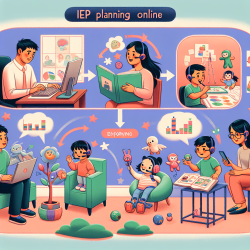Understanding the Challenges of IEP Planning
Individualized Education Programs (IEPs) are a cornerstone of special education, designed to meet the unique needs of each child. However, the process of planning and executing these programs can often lead to burnout among educators and administrators. With the increasing demand for specialized services and the limited availability of resources, it becomes imperative to find innovative solutions that can alleviate this pressure.
The Role of Online Therapy in Special Education
Online therapy services, such as those provided by TinyEYE, offer a data-driven approach to support the IEP process. By leveraging technology, we can deliver consistent, high-quality therapy sessions that are both effective and efficient. This not only supports the speech therapy evaluation process but also addresses the mental health needs of students, which are crucial components of a comprehensive IEP.
Benefits of Integrating Online Therapy into IEP Planning
- Accessibility: Online therapy removes geographical barriers, ensuring that all students have access to the services they need, regardless of location.
- Flexibility: Sessions can be scheduled at convenient times, reducing the stress on both students and educators.
- Data-Driven Decisions: With online platforms, progress can be tracked and analyzed, providing concrete data to inform IEP meetings and adjustments.
- Resource Optimization: By utilizing online therapy, schools can optimize their resources, ensuring that funds are used effectively to support student outcomes.
Taking the Next Step: Implementing Online Therapy in IEPs
For special education funding agencies, the integration of online therapy services represents a strategic investment in the future of education. By supporting the implementation of these services, agencies can help schools overcome the challenges of IEP planning and execution, leading to improved educational outcomes for children.
It is time to consider the benefits of online therapy and take the necessary steps to integrate these services into the IEP framework. By doing so, we can ensure that every child receives the personalized support they need to succeed.
Conclusion
In conclusion, the integration of online therapy services into IEP planning offers a viable solution to the burnout faced by educators and administrators. By providing accessible, flexible, and data-driven therapy options, we can enhance the quality of special education and create better outcomes for children. It is essential for special education funding agencies to recognize the value of these services and take the next step towards their implementation.










